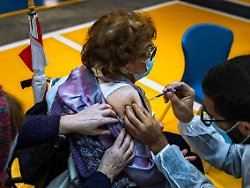Friday, January 22nd, 2021
Fight against Corona in Israel
"When it comes to vaccination, we are world champions"
No country is vaccinating its people at such a rate as Israel. In the "Zero Hour" podcast, Grisha Alroi-Arloser, Managing Director of the Israeli-German Chamber of Commerce and Industry, tells how the country has managed to go from being a negative example with enormous numbers of infections to becoming a pioneer.
35 percent of Israel's residents have received their first dose of the corona vaccine so far. In Germany it is less than one percent. There are four reasons for the success of the vaccination campaign in Israel, says Grisha Alroi-Arlose in the podcast "Die Stunden Null". "The Israeli government realized very quickly that vaccination is basically the only really viable way out of this crisis." The contract with the manufacturers Biontech and Pfizer was signed at the same time as the EU last November – but Israel was willing to pay significantly more. "It's a very, very good investment," says Alroi-Arloser.
While the "vaccination offer for everyone" is being pushed back more and more in this country, over 200,000 people are vaccinated every day in Israel. According to Alroi-Arloser, a second reason for this rapid success is the centralized health system, which is based on four health insurance companies. "They have their own hospitals and are therefore also involved in the vaccination and in addressing the insured digitally." In addition, there is a large-scale advertising campaign with well-known personalities, clergy and politicians, as well as cooperation with vaccine manufacturers. "The government is ready to provide anonymized data in order to be able to make statements about the effectiveness and the side effects," says the AHK managing director.
Alroi-Arloser, who grew up in North Rhine-Westphalia, can understand German concerns about data protection. But he also says: "In Germany, from my point of view, it is sometimes totally exaggerated. That sometimes people have to be written to by post because for data protection reasons the contact details cannot be used digitally even though they are available, that borders on a public prank."
As in this country, the effects of the crisis in Israel are enormous. The number of infections was and is high, the unemployment rate temporarily rose to 26 percent, and the gross domestic product plummeted. But the country, which is known for its high-tech companies, reacted quickly to the changed requirements. "The fact is that Israel's engine of growth, namely the high-tech industry, has been affected relatively little, that foreign direct investment has only seen a small dent and that the Israeli startup scene is still thriving." The crisis could also be an opportunity for macroeconomic productivity gains in the post-Corona period.
Hear in the new episode of "The Zero Hour" why Israel is less strict than Germany when it comes to data protection and how Grisha Alroi-Arloser experienced its own vaccination.
You can find all the episodes of "The Zero Hour" directly at Audio Now, Apple or Spotify or via Google.
.
